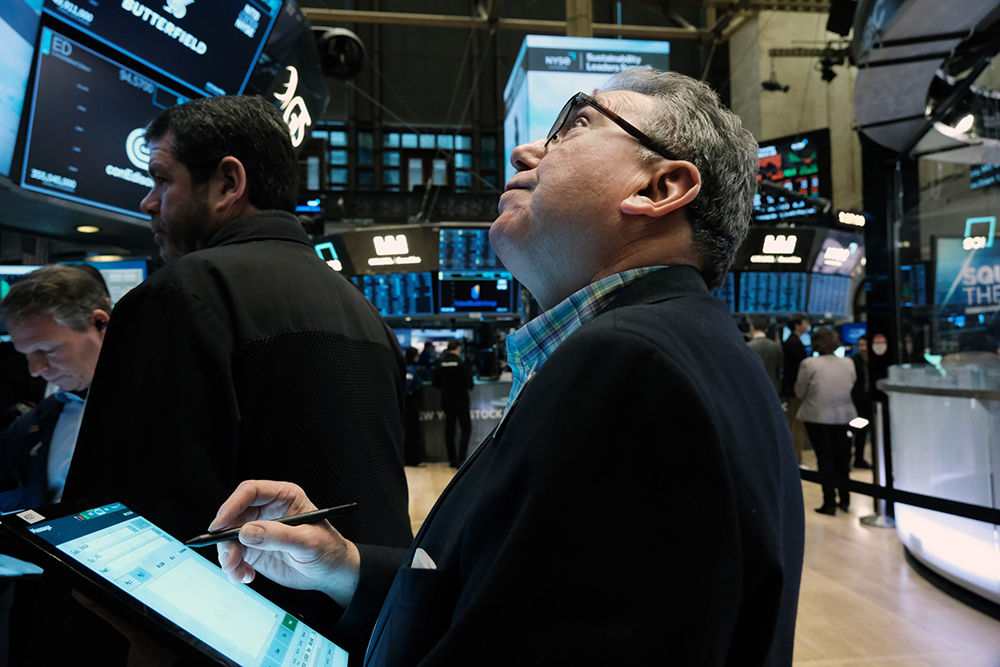
2005年,在次貸危機引發大蕭條、導致數百萬美國人失去住房的幾年前,拉里·麥克唐納(Larry McDonald)還是臭名昭著、現已倒閉的全球金融服務公司雷曼兄弟(Lehman Brothers)的副總裁。作為一名年輕的交易員,他和許多同行警告說,當年房地產市場出現了問題。多年后,他在《紐約時報》2009年的一篇文章中解釋說,房地產市場陷入“寅吃卯糧的窘境中”,而雷曼兄弟則“直接沖向了有史以來最大的次貸冰山”。
但麥克唐納的雇主無視他的警告,在2008年房地產泡沫破裂后,擁有158年歷史的雷曼兄弟最終破產。在2009年3月結束的長達17個月的熊市中,標準普爾500指數暴跌約50%。
如今,擁有廣泛讀者的投資通訊《熊市陷阱報告》(The Bear Traps Report)的編輯和創始人麥克唐納警告稱,另一場股市崩盤即將來臨。他說,他在次貸危機后開發的“雷曼系統性風險指標”——包括企業違約率、股票市場放空比率和投資者情緒調查——都發出警告信號。
他周二對美國全國廣播公司財經頻道(CNBC)表示:“我們的21項雷曼系統性風險指標顯示,未來60天內崩盤或大幅下跌的概率最高,發生概率是自新冠肺炎疫情以來最高的。”他指的是2020年3月新冠肺炎疫情引發股市下跌。
麥克唐納認為,在硅谷銀行(Silicon Valley Bank))和簽名銀行(Signature Bank)倒閉以及瑞士貸款機構瑞士信貸(Credit Suisse)意外倒閉之后,投資者忽視了“滾動信貸危機”的風險,卻過度關注人工智能和機器人等新技術的崛起。
他警告說:“我們以前在雷曼事件看到過這種情況,后來發生的情況是,沖擊來了,信貸市場開始對風險進行定價,但股市卻沒有。他們關注的是像人工智能或是上世紀90年代的互聯網革命之類的東西。”這表明他認為投資者在2001年互聯網泡沫破裂導致股市暴跌之前犯了各種各樣的錯誤。
麥克唐納指出,即使在聯邦存款保險公司(FDIC)本月介入拯救硅谷銀行和簽名銀行未投保和已投保儲戶之后,美國各銀行仍坐擁數千億美元未變現虧損。抵押貸款支持證券和美國國債是許多銀行持有的主要資產,在美聯儲去年大舉加息后,這些證券的價值大幅縮水。這些損失已導致一些銀行嚴重不穩定,迫使許多同行收緊貸款標準,并為潛在的銀行擠兌做準備。
麥克唐納說,由于放貸放緩,銀行業的問題現在開始蔓延到商業房地產市場。他擔心,隨著美聯儲繼續加息以抗擊通脹,這些問題可能會影響經濟領域的其他部門。
麥克唐納說,好消息是,這不是“雷曼事件”,不會導致毀滅性經濟衰退,“這只是一場緩慢滾動的信貸危機,因為美聯儲正在幕后抗擊這場危機。”但他警告說,這并不意味著股市是安全的——股市即將大幅下跌。(財富中文網)
譯者:中慧言-王芳
2005年,在次貸危機引發大蕭條、導致數百萬美國人失去住房的幾年前,拉里·麥克唐納(Larry McDonald)還是臭名昭著、現已倒閉的全球金融服務公司雷曼兄弟(Lehman Brothers)的副總裁。作為一名年輕的交易員,他和許多同行警告說,當年房地產市場出現了問題。多年后,他在《紐約時報》2009年的一篇文章中解釋說,房地產市場陷入“寅吃卯糧的窘境中”,而雷曼兄弟則“直接沖向了有史以來最大的次貸冰山”。
但麥克唐納的雇主無視他的警告,在2008年房地產泡沫破裂后,擁有158年歷史的雷曼兄弟最終破產。在2009年3月結束的長達17個月的熊市中,標準普爾500指數暴跌約50%。
如今,擁有廣泛讀者的投資通訊《熊市陷阱報告》(The Bear Traps Report)的編輯和創始人麥克唐納警告稱,另一場股市崩盤即將來臨。他說,他在次貸危機后開發的“雷曼系統性風險指標”——包括企業違約率、股票市場放空比率和投資者情緒調查——都發出警告信號。
他周二對美國全國廣播公司財經頻道(CNBC)表示:“我們的21項雷曼系統性風險指標顯示,未來60天內崩盤或大幅下跌的概率最高,發生概率是自新冠肺炎疫情以來最高的。”他指的是2020年3月新冠肺炎疫情引發股市下跌。
麥克唐納認為,在硅谷銀行(Silicon Valley Bank))和簽名銀行(Signature Bank)倒閉以及瑞士貸款機構瑞士信貸(Credit Suisse)意外倒閉之后,投資者忽視了“滾動信貸危機”的風險,卻過度關注人工智能和機器人等新技術的崛起。
他警告說:“我們以前在雷曼事件看到過這種情況,后來發生的情況是,沖擊來了,信貸市場開始對風險進行定價,但股市卻沒有。他們關注的是像人工智能或是上世紀90年代的互聯網革命之類的東西。”這表明他認為投資者在2001年互聯網泡沫破裂導致股市暴跌之前犯了各種各樣的錯誤。
麥克唐納指出,即使在聯邦存款保險公司(FDIC)本月介入拯救硅谷銀行和簽名銀行未投保和已投保儲戶之后,美國各銀行仍坐擁數千億美元未變現虧損。抵押貸款支持證券和美國國債是許多銀行持有的主要資產,在美聯儲去年大舉加息后,這些證券的價值大幅縮水。這些損失已導致一些銀行嚴重不穩定,迫使許多同行收緊貸款標準,并為潛在的銀行擠兌做準備。
麥克唐納說,由于放貸放緩,銀行業的問題現在開始蔓延到商業房地產市場。他擔心,隨著美聯儲繼續加息以抗擊通脹,這些問題可能會影響經濟領域的其他部門。
麥克唐納說,好消息是,這不是“雷曼事件”,不會導致毀滅性經濟衰退,“這只是一場緩慢滾動的信貸危機,因為美聯儲正在幕后抗擊這場危機。”但他警告說,這并不意味著股市是安全的——股市即將大幅下跌。(財富中文網)
譯者:中慧言-王芳
In 2005, years before the subprime mortgage crisis kicked off the Great Recession and led millions of Americans to lose their homes, Larry McDonald was a vice president at the infamous now-defunct global financial services firm Lehman Brothers. As a young trader he, along with many of his peers, warned that something was wrong in the real estate market that year. It “was living on borrowed time,” he would explain years later in a 2009 New York Times article, and Lehman Brothers “was headed directly for the biggest subprime iceberg ever seen.”
"But McDonald’s bosses ignored his warnings, and the 158-year-old institution that was Lehman eventually went under in 2008 after the housing bubble cracked. The S&P 500 would go on to lose roughly 50% of its value in the 17-month bear market that ended in March 2009.
Now, McDonald, the editor and founder of the widely read investing newsletter The Bear Traps Report, is warning that another stock market crash is on the way. He says the “Lehman systemic risk indicators” that he developed after the subprime mortgage crisis—which include things like the corporate default rate, stock market short-interest ratios, and investor sentiment surveys—are all flashing warning signs.
“[O]ur 21 Lehman systemic risk indicators are pointing at the highest probability of a crash or a sharp drawdown in the next 60 days—the highest probability since COVID,” he told CNBC Tuesday, referencing the COVID-induced market drop of March 2020.
McDonald believes investors are ignoring the risk of a “rolling credit crisis” after the failure of Silicon Valley Bank and Signature Bank as well as the unexpected demise of the Swiss lender Credit Suisse, and focusing too much on the rise of new technologies like artificial intelligence and robotics.
“We saw this before with Lehman, what happens is a shock comes in, credit markets start pricing the risk, but equities don’t. They focus on things like A.I. or things like the dotcom revolution in the ’90s,” he warned, giving a nod to the errors investors made before the dotcom bubble’s blowup sent stocks tumbling in 2001.
McDonald noted that even after the Federal Deposit Insurance Corporation (FDIC) stepped in to save both uninsured and insured depositors at SVB and Signature Bank this month, U.S. banks are still sitting on hundreds of billions of dollars in unrealized losses. The mortgage-backed securities and U.S. Treasuries that make up a majority of many banks’ holdings have seen their value slashed after a series of aggressive Federal Reserve interest rate hikes this past year. These losses have led to significant instability at some banks, forcing many of their peers to tighten lending standards and prepare for potential bank runs.
McDonald said banks’ issues are beginning to spread to the commercial real estate market now as a result of the lending slowdown, and he worries they could infect other sectors of the economy as the Fed raises rates to fight inflation.
The good news is this is “not a Lehman event” that will cause a devastating recession, “it’s just a rolling, slow-moving credit crisis, because the Fed is fighting it behind the scenes,” McDonald said. But that doesn’t mean stocks are safe—a sharp drawdown is on its way, he warned.






